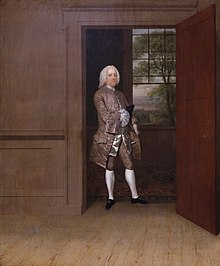Thomas Penn | |
|---|---|
 Thomas Penn depicted in a 1752 portrait | |
| Chief proprietor of Pennsylvania | |
| In office 1746–1775 | |
| Monarchs | George II (1746–1760) George III (1760–1775) |
| Preceded by | John Penn |
| Succeeded by | John Penn |
| Personal details | |
| Born | 19 March 1702 [O.S. 8 March 1702] Kensington, London, Kingdom of Great Britain |
| Died | 21 March 1775 (aged 73) Stoke Poges, Buckinghamshire, Kingdom of Great Britain |
| Spouse | Lady Juliana Fermor Penn (m. 1751) |
| Children | 8, including Granville |
| Parent(s) | William Penn Hannah Callowhill Penn |
| Profession | Landowner, mercer |
Thomas Penn (19 March 1702 [O.S. 8 March 1702] – 21 March 1775)[a] was an English landowner and mercer who was the chief proprietor of Pennsylvania from 1746 to 1775. He was one of 17 children of William Penn, the founder of the colonial-era Province of Pennsylvania in British America. In 1737, Thomas Penn negotiated the Walking Purchase, a contested land cession treaty he negotiated with Lenape chief Lappawinsoe that transferred control over 1,200,000 acres (4,860 km2) of territory in the present-day Lehigh Valley and Northeastern Pennsylvania regions of Pennsylvania and a portion of West Jersey in colonial New Jersey from the Lenape tribe to the Province of Pennsylvania.
Born in 1702 in Kensington, England into a Quaker family, Penn was apprenticed to a London mercer at a young age by his father William due to his family's financial insecurity. When his father died in 1718, William's last will and testament gave his proprietorship of Pennsylvania to his three sons, including Penn. In 1732, Penn travelled to the colony to assume control over his family's interests in Pennsylvania, including collecting unpaid rents.
As his family back in England were deeply in debt, Penn abandoned his father's conciliatory approach towards Indian tribes residing on the colonial frontier in order to acquire more land to sell. In addition to signing treaties with Indian leaders, Penn strengthened the power of the deputy governor and frequently used his prerogative to overturn legislation from the Pennsylvania General Assembly, acts which made him unpopular in the colony.
Penn returned to England in 1741, though he continued to exert control over affairs in Pennsylvania. When his brother John died in 1746, his will and testament passed control over John's share of the family proprietorship to Penn, making his the chief proprietor of Pennsylvania. In 1751, he married Lady Juliana Fermor, who he went on to have seven children with. Penn eventually died at his country estate of Stoke Park, Buckinghamshire in 1775.
Cite error: There are <ref group=lower-alpha> tags or {{efn}} templates on this page, but the references will not show without a {{reflist|group=lower-alpha}} template or {{notelist}} template (see the help page).